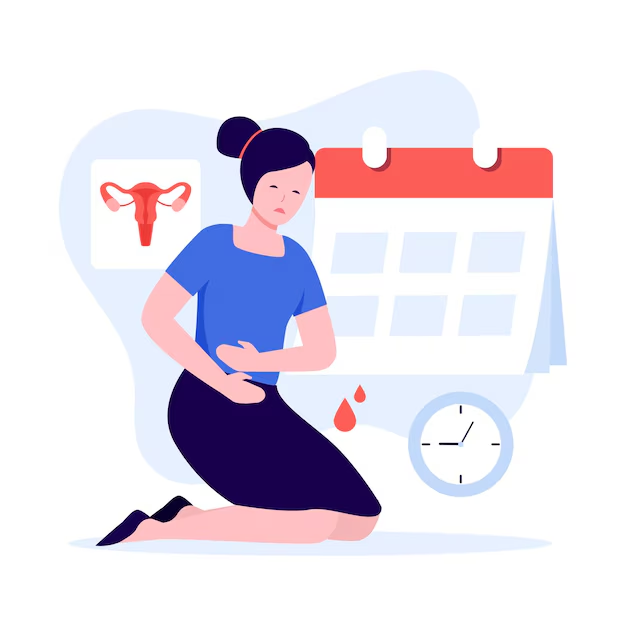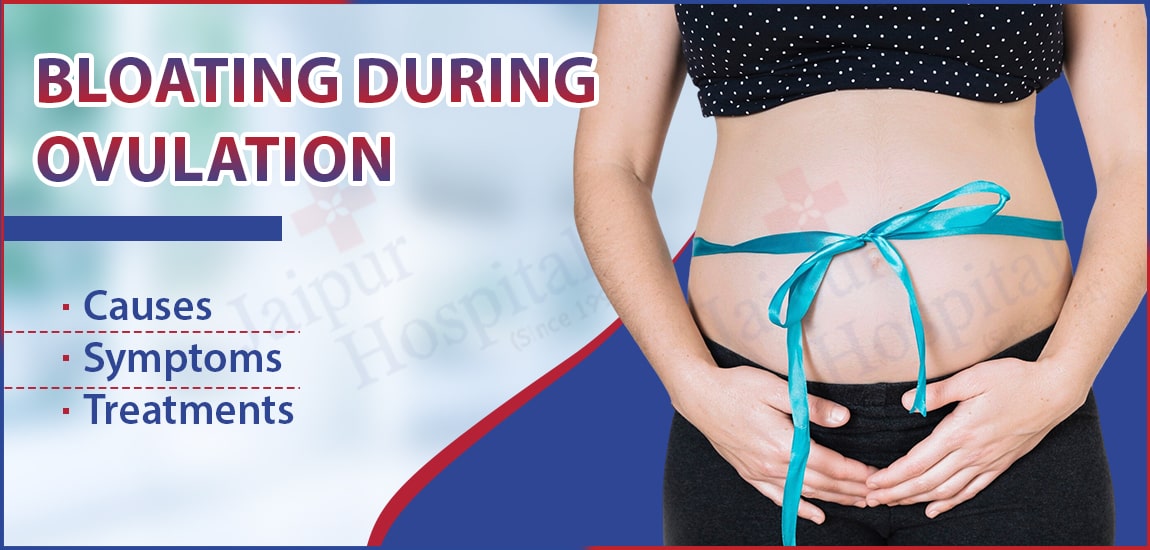Overview
Bloating During Ovulation is a common symptom but remains ignored by most people. Many women feel bloated as they approach their menstruation period. This will be accompanied by discomfort, some digestive problems, and maybe a weight variation and temporary fullness or swelling in the abdomen. Knowing the reasons that cause bloating when ovulating or its causes and how to manage it will help relieve the uneasy feeling and improve well-being.
In this article, we shall look at some of the symptoms of bloating during ovulation, some hormonal and physiological causes of this condition, and the treatment options available- dietary changes, lifestyle changes, and medical treatments.
What is Ovulation Bloating?
Bloating during ovulation is a brief feeling of heaviness, tightness, or swelling in the abdomen throughout the time of ovulation, most often at the mid-cycle phase of menstruation. Hormonal variations, fluid retention, and changes in digestion cause discomfort and distension of the belly.
Causes of Bloating During Ovulation
Sometimes called ovulation bloat, such bloating is brought about by the change in hormones and shifts in physiological processes around the ovulation window of the menstrual cycle. Below are the main causes:
- Hormonal Changes: During ovulation, the estrogen level peaks, leading to a surge in luteinizing hormone (LH) in a way that will cause the egg’s release. Estrogen may affect fluid balance by acting on antidiuretic hormone (ADH) and renin-angiotensin pathways, thus causing little water retention and bloating.
- Water Retention: Control through renal sodium and water retention occurs through estrogen and progesterone. Preovulatory high estrogen levels increase tissue fluid, resulting in transient bloating. Higher progesterone levels after ovulation may also affect the body’s fluid retention by relaxing blood vessels and altering electrolyte balance.
- Increased Blood Flow to the Ovaries: Vascularity is increased in ovulatory follicles preparing to release an egg. Blood vessel dilation and increased blood flow may cause slight swelling of the lower abdomen, resulting in bloating.
- Follicle Growth and Rupture: The dominant follicle containing the egg enlarges to about 2 cm before rupturing. The rupturing of the follicle will release the egg, along with some fluid and minor bleeding; this can irritate the peritoneal cavity, leading to temporary bloating or discomfort.
- Changes in Digestion: Post-ovulation, progesterone levels are elevated and slow gut motility by relaxing smooth muscles in the digestive tract. Slow digestion may result in some bloating, fullness, and mild indigestion.
- Gas and Constipation: This secretion of progesterone slows down the process of digestion, thus affecting bowel movements and increasing gas and constipation. Besides gas, estrogen can also alter gut microbiota, influencing the fermentation processes that contribute to bloating.
- Inflammation from Ovulation: When the follicle ruptures, a localized inflammatory response may be triggered in the ovary and surrounding tissues. The mild irritation can lead to bloating and discomfort, sometimes accompanied by ovulation pain (mittelschmerz).
Read Also: Low Blood Sugar (Hypoglycemia): Causes, Symptoms, Management, and Prevention
Symptoms of Bloating During Ovulation
Bloating during ovulation is a mundane symptom stemming from hormonal changes and physiological processes in the menstrual cycle’s ovulation phase. While estrogen and progesterone prepare the body for egg release, their elevation can cause another set of events involving fluid retention, digestive disturbances, and abdominal pain. With that in mind, here are some important symptoms:
- Abdominal Distension: Around ovulation, many women experience the lower abdomen’s noticeable fullness or distension due to fluid retention caused by hormonal changes. This makes the other parts of the abdomen feel bloated and puffy.
- Stomach Tightening: The belly commonly feels pressure or tightness caused by increased water retention and gas accumulation, making the stomach feel stretched and painful, even if there is no major weight gain.
- Mild to Moderate Abdominal Distress: Some women may feel cramps and ache mildly, the pain occurring just next to the ovaries. Discomfort arises when the follicle releases an egg, thus prompting some irritation and increased blood flow to the area in the pelvis.
- Increased Gas: Hormonal fluctuations, namely rising progesterone levels, tend to slow digestion, allowing for excess gas production. All of this can contribute to bloatedness, burping, or flatulence, which may contribute to abdominal discomfort.

- Constipation or Irregular Bowel Movement: The relaxing effect of progesterone governs the functioning of the digestive tract muscles, thus slowing down bowel movements. Constipation, irregular stool patterns, or a state of difficulty in passing stools all trigger bloating.
- Feeling Full Quickly: Some women may feel overly full shortly after eating a small meal. This is because bloating causes pressure in the stomach, leaving less room for food and, as a result, early satiety.
- Temporary Weight Gain: Some women observe a minor increase in body weight around ovulation, attributed to water retention. Such temporary changes usually revert as fluid levels in the body stabilize post-ovulation.
- Mild Pressure in the Pelvis: Some women feel very mild pressure in the lower abdomen or a sensation of heaviness. It is due to ovarian activity with increased blood circulation and slight swelling of the reproductive organs on account of ovulation.
Read Also: What is Dementia: Causes, Symptoms, Treatment, and Risk factors?
How Ovulation and Back Pain Are Interrelated?
Hormonal changes, ovarian activity, and nerve connections in the pelvic region link ovulation and back pain. The ovulating dominant ovarian follicle continues to grow until it ruptures to release the egg; mild inflammation and irritation of surrounding tissues are the inevitable results of this. This may give rise to referred pain in the lower back, similar to menstrual cramps. Increased estrogen levels might also cause ligament relaxation and change spinal support, contributing to soreness.
Prostaglandins involved in ovulation are hormone-like chemicals that can trigger uterine contractions and inflammation with resultant lower back pain. In some cases, this pain may be exacerbated by conditions such as ovarian cysts or endometriosis that worsen symptoms. Milder discomfort is to be expected; however, detailed assessment would be needed in cases of sharply increased or continuous pain.
When to See a Doctor?
In many cases, bloating during ovulation is considered temporary and will disappear spontaneously. It can, however, be caused by an underlying health complication requiring medical attention. You should visit a doctor when experiencing:
- Severe or Lingering Bloating: This is when bloating has persisted for two weeks or is worsening, as this can likely signal an underlying illness such as a digestive disorder, ovarian cysts, or any other medical condition.
- Intense Abdominal Pain: This is defined as sharp, severe, or prolonged agony, especially if it does not cease after ovulation; it may be signaling a ruptured ovarian cyst, endometriosis, or another underlying issue.
- Sudden or Excessive Weight Gain: Excessive weight gain, suddenly or otherwise, accompanies bloating and could mark the appearance of fluid retention by hormonal imbalances, PCOS, or several other medical conditions.
- Change in Bowel Movement: Chronic constipation, diarrhea, or change in alternate bowel habits with bloating may signify irritable bowel syndrome (IBS) or other gastrointestinal complications.
- Continued Nausea and Vomiting: Continual nausea or vomiting with bloating may hint at infection, a gastrointestinal issue, or even an ovarian torsion.
- Yet Painful, yet Irregular Periods: When pressure is ever accompanied by ovulation bloation, old or new pain intensely during periods, coupled with irregular cycles or heavy bleeding, it is often considered endometriosis or fibroids.
- Shortness of Breath or Severe Swelling: Severe shortness of breath combined with extreme swelling either affects the entire body or concentrates on a particular organ; it could be indicative of major problems such as ovarian hyperstimulation syndrome (OHSS) or some serious heart-related issues.
How to Reduce Bloating During Ovulation or Treatment?
Bloating during ovulation is commonly due to hormone fluctuations, fluid retention, and slow digestion. Though it usually resolves spontaneously, certain lifestyle changes and remedies can ease the discomfort. The following are good ways to reduce ovulation-induced bloating:

Lifestyle and Diet Changes
- Increase Fluid Intake: Drinking water helps eliminate excess sodium from the body and decreases water retention.
- Eat a Balanced Diet: Include fiber-rich foods such as fruits, vegetables, and whole grains that help digestion and avoid constipation.
- Minimize Sodium Intake: Salt and processed foods increase sodium retention in the body and the maintenance of water, aggravating the bloating.
- Avoid Soda and Other Gas-Forming Drinks: The carbonation in these drinks can lead to the formation of gas, exacerbating your bloated feeling.
- Eat Smaller Meals Often: Smaller meals will allow digestion to function quicker and help keep the bloated feeling at bay.
- Avoid Foods That Cause Gas: Limit your intake of beans, cabbage, and broccoli; also, avoid dairy products if you are lactose-intolerant.
Physical Activity and Exercise
- Stay Active: Mild exercises such as walking, yoga, and stretching may help relieve bloating occurring due to improper digestion and fluid retention.
- Get Relief with Gentle Abdominal Massages: Massaging the belly might provide some gas release and relief from bloating.
Home Remedies and Natural Treatment Options
- Herbal Teas: Peppermint, ginger, and chamomile tea may aid digestion and relieve bloating.
- Foods Rich in Magnesium: Bananas, spinach, and almonds can help control fluid balance and decrease bloating.
- Probiotic Foods: These include yogurt and other fermented foods that help the gut and eliminate bloating due to slow digestion.
Medication Interventions
- Over-the-counter medicines: Another anti-gas medication (simethicone) or a weak diuretic could help relieve the bloating.
- Hormonal therapy: If the bloating is intense and tied to some hormonal imbalance, a doctor may prescribe birth control pills targeted toward stabilizing the hormone levels.
- Seek medical attention: If there is extreme bloating with the presence of other symptoms such as pain, nausea, and irregular periods.
Conclusion
Bloating During Ovulation is the most common condition caused by hormonal fluctuations, along with the retention of fluids and slower digestion, which occur throughout the menstrual cycle. Although usually temporary, it can cause temporary discomfort and inconvenience in everyday activities.
Simple changes in lifestyle, such as hydration, a healthy diet, and mild exercise, can help give some relief from bloating. On the other hand, if the bloating is severe or persisting, it may require a medical diagnosis to evaluate further possible underlying conditions.
Jaipur Hospital offers specific care with advanced diagnostic tools, carrying out hormonal checks, customizing treatment plans regarding ovulation-related bloating, and improving overall wellness.


